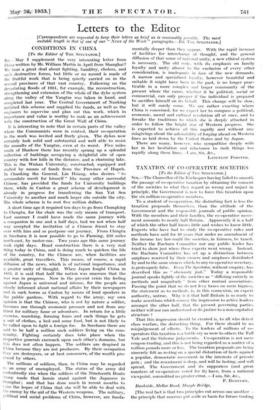Letters to the Editor
[Correspondents are requested to keep their letters as brief as is reasonably possible. The most suitable length is that of one of our News of the Week" paragraphs.—Ed. Tut: SPECTATOR.]
CONDITIONS IN CHINA
[To the Editor of THE SPECTATOR.] Sun,—May I supplement the very interesting letter from China written by Mr. William Martin in April from Shanghai? We hear a great deal about fighting, banditry, cholera, and such destructive forces, but little or no record is made of the fruitful work that is being quietly carried on in the several provinces of that vast country. Following on the devastating floods of 1931, for example, the reconstruction, strengthening and extension of the whole of the dyke system along the valley of the Yangtze was taken in hand, and completed last year. The Central Government of Nanking
initiated this scheme and supplied the funds, as well as the engineers to supervise and plan out this work, which in importance and .value is worthy to rank as an achievement with the construction of the Great Wall of China.
It is interesting to note that in certain parts of the valley where the Communists were in control, their co-operation in the work was invited and freely given. The dykes now certainly look solid and substantial and well able to resist the assaults of the Yangtze, even at its worst. Five miles south of Hankow there has recently sprung up a splendid collection of buildings occupying a delightful site of open country with low hills in the distance, and a charming lake. This is the Wuhan University, constructed, equipped and staffed by means of funds from the Province of Hupeh. In Chunking the - General, Lin Hsiang, who desires to accumulate merit for himself " like many other successful Chinese, has provided the funds for University buildings there, while in Canton a great scheme of development is already in progress for transferring the Sun Yat Sen University to another and much larger site outside the city. The whole scheme is to cost five million dollars.
A short time ago it required ten days to go from Chungking
to Chengtu, for the chair was the only means of transport. Last summer I could have made the same journey with a companion in one and a half days, had we not when half way accepted the invitation of a Chinese friend to stay over with him and so postpone our journey. From Chingtu in Szechuen it is now possible to go to Paoning, 250 miles north-east, by motor-car. Two years ago this same journey took eight days. Road construction there is a very real thing today in China, and is doing much to quicken the life of the country, for the Chinese are, when facilities are available, great travellers. This means, of course, a rapid diffusion of the news, which is of national importance, and a greater unity of thought. When Japan fought China in 1895, it is said that half the nation was unaware that the war was in progress. Now in the present crisis the feeling against Japan- is universal and intense, for the people are closely informed about national affairs by their newspapers and in such towns as Canton by means of loud speakers in the public gardens. With regard to the army, my own opinion is that the Chinese, who is not by nature a soldier, becomes one through economic pressure and not from any thirst for military fame or adventure. In return for a little exercise, marching, forming fours and such things he gets a suit of clothes, a bed and some food, but is not likely to be called upon to fight a foreign foe. In Szechuen there are said to be half a million such soldiers living on the com- munity. Fighting certainly does take place when the respective generals encroach upon each other's domains, but this does not often happen. The soldiers are despised in China because they are not producers. By their occupation they are destroyers, or at best consumers, of the wealth pro- duced by others.
The millions of soldiers, then, in China may be regarded as an army of unemployed. The status of the army did undoubtedly rise when the soldiers of the Nineteenth Route Army made that heroic stand against the Japanese in Shanghai ; and that has done much in recent months to raise the hopes of China that she will be able to deal with the enemy by the aid of the Western weapons. The military, political and social problems of China, however, are funda- mentally deeper than they appear. With the rapid increase of facilities for interchange of thought; and the general diffusion of that sense of national unity, a new ethical system is necessary. The old code, with its emphasis on family loyalty and unity almost to the exclusion of every other consideration, is inadequate in face of the new demands. A narrow and specialized loyalty, however beautiful and suitable it might have been in the past, is no longer prac- ticable in a more complex and larger community of the present where the cause, whether it be political, social or commercial, can only prosper if the individual is prepared to sacrifice himself on its behalf. This change will be slow, but it will surely come. We are rather exacting where China is concerned, for we expect her to compass a political, economic, moral and cultural revolution all at once, and to forsake the traditions to which she is deeply attached in order to follow the bright star of Western progress. She is expected to achieve all this rapidly and without any Misgivings about the advisability of forging ahead on Western lines as laid down by the United States and by Japan.
There are many, however, who sympathize deeply with her in her hesitation and reluctance to rush things too rapidly along these lines.-1 am, Sir, &c., LANCELOT FORSTER.
















































 Previous page
Previous page